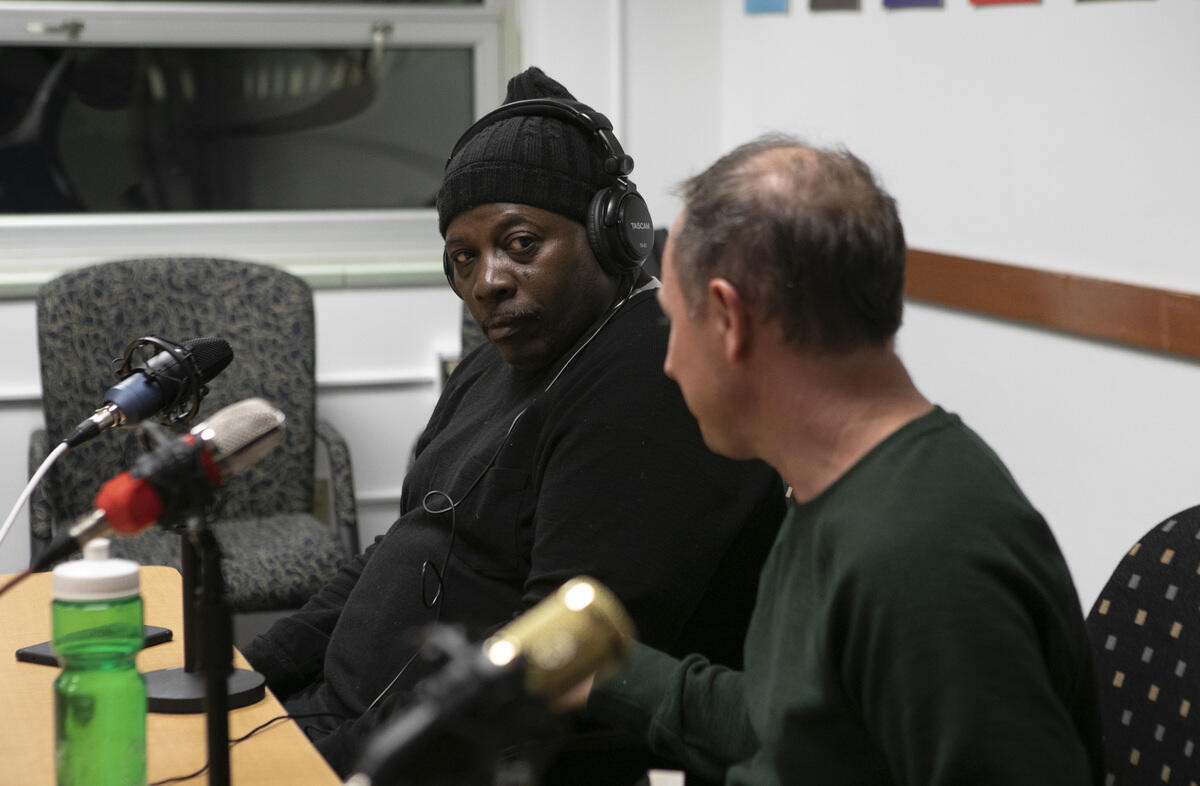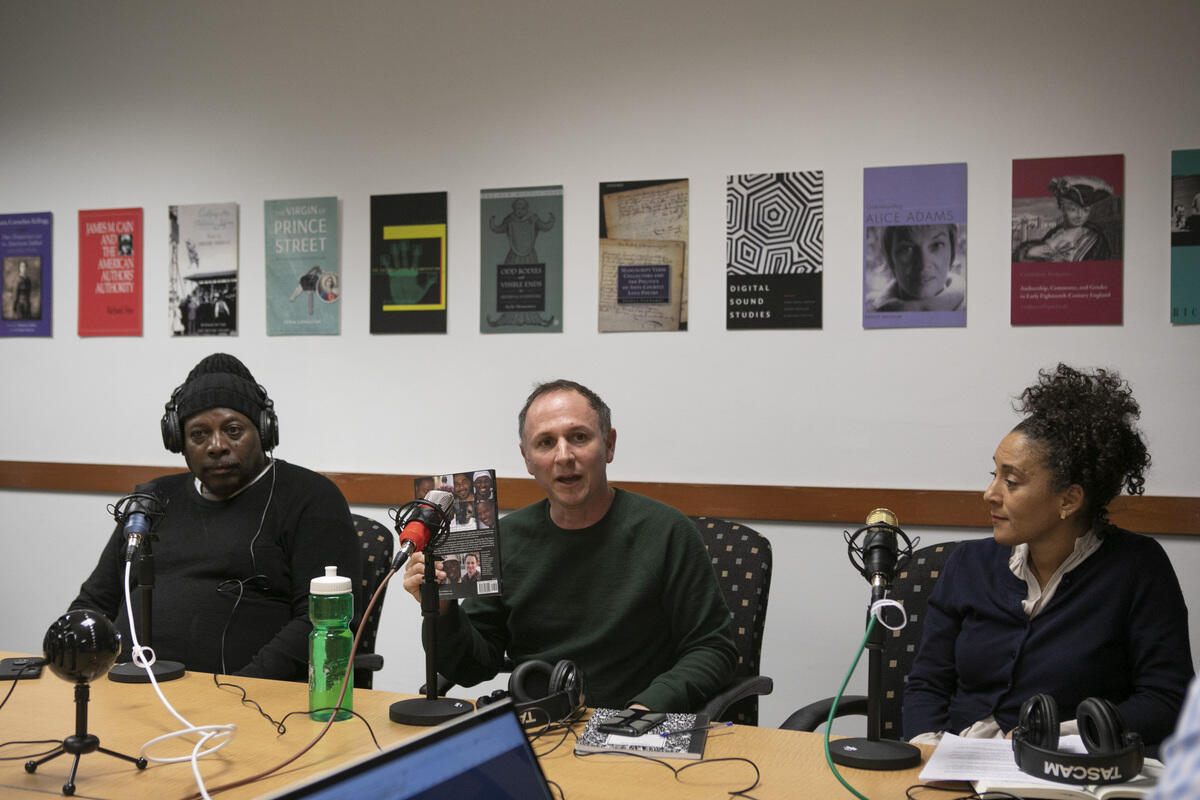
June 12, 2020
‘Writing Our Way Out’ podcast explores traps and turning points that can lead to prison in America
VCU English professor David Coogan is hosting a podcast version of the book “Writing Our Way Out: Memoirs from Jail” that he co-wrote with 10 former Richmond City Jail inmates.
Share this story
Dean Turner is recounting a pivotal and terrible moment from his childhood. Speaking into a microphone before a small audience in a Virginia Commonwealth University classroom — before the pandemic shut down campus — Turner begins his story by saying that he can’t recall what made his mother so angry, but that he remembers vividly what happened next.
“She’s frustrated because I’m hiding under the bed,” Turner said. “Knowing she can’t get a good hit with the belt makes her even madder. So my mother leaves the room to go get reinforcement. Now I’m thinking that she’s going to get my stepfather, but she returns with scissors and begins stabbing in different places. I can’t believe it. My mom is going to kill me. What have I done that is so bad that she wants to hurt me like this?”
Turner was reading from a memoir he wrote that was included in the 2015 book “Writing Our Way Out: Memoirs from Jail.” That book grew out of a writing class taught in the Richmond City Jail by David Coogan, Ph.D., an associate professor in the Department of English in the College of Humanities and Sciences at VCU.
Turner was one of 10 co-authors who tell their stories in the book edited by Coogan, revealing the conditions, traps and turning points that put them on the path to imprisonment as well as their ultimate journey to reentry.
“Writing Our Way Out” is now being adapted into a podcast, hosted by Coogan and featuring many of the book’s co-authors. In the podcast’s first season, episodes explore early moments — such as Turner being stabbed by his mother — that may have played a role in determining the co-authors’ fate.
“I’m a big fan of podcasts and I was just thinking it through and realizing, well, the stories in the book are compelling,” Coogan said. “What if I remix them so that it’s not retelling the whole book, but just select moments in people’s lives beginning with childhood, and tell those stories in the first season that sets a person in this direction, in a path towards the criminal justice system?”

Since the book came out five years ago, “Writing Our Way Out” has been adapted as a play and a musical performance, and led to a criminal justice diversion program offered in partnership with Richmond’s Office of the Commonwealth’s Attorney. The program gives low-level offenders a chance to take Coogan’s class, “English 366: Writing and Social Change,” alongside VCU students instead of serving time in jail.
Coogan and the co-authors have done more than 60 public events about the book and its message of the redemptive power of memoir.
“We’ve had many, many encounters with audiences who are just hungry to talk about the cycle of crime, the cycle of addiction, and the prospect of building a better life through writing,” Coogan said. “But there’s a lot of people that don’t come to book events. A lot of people that don’t read books or buy books. And we wanted to reach more people with this message that you can write your way out.”
Most episodes pull stories from the book, and a special guest helps provide expert analysis. Turner’s episode, for example, featured Zewelanji Serpell, Ph.D., a VCU psychology associate professor and developmental psychologist.
After Turner read his story from “Writing Our Way Out,” Serpell reflected on a passage in which Turner describes having conflicted feelings about his mother after the stabbing, both caring for her and wanting to protect her from the police while also feeling betrayed, hurt and unsafe.
“We know from our understanding of how children develop that trust and the sense of love and belonging is very, very important. And so there are things about physical punishment or that whooping or that beating that keep you in line but also communicate caring,” Serpell said. “In this particular incident, the type of physical discipline she used was unfamiliar. It was more severe than you had experienced before. It was different.”
Serpell said Turner’s experience captures key findings from research into physical discipline on children. On one hand, physical discipline can lead to compliance, she said, but when it crosses the line into abuse, it can lead to negative outcomes.
“It keeps your child in check but that can escalate and move to a place where it is shocking like the way that you described it. It’s an anomaly. It feels scary. It doesn’t feel like it’s keeping you in check anymore,” she said.
While the show’s first season is focused on early formative stories from childhood, future seasons will delve into stories of the co-authors’ fall into crime, their time in jail and reentry.
The first episode, “The Race Question,” asks what happens when African American children first encounter the reality of racism, and how those encounters can influence behavior. The second, “The Meaning of Manhood,” explores childhoods and upbringings, early experiences, and how early backgrounds can shape men’s adult lives.

Producing the podcast is Robb Crocker, a former journalist with stops at The Washington Post, Richmond.com, WTVR-TV and WRIC-TV. Crocker received degrees in mass communications in print and broadcast journalism from VCU in 2001 and 2002, and a master’s degree in communications from Rutgers University in 2012. He completed a bachelor’s degree in English from VCU this year and is currently a student in VCU’s interdisciplinary doctoral program in Media, Art and Text. Crocker started his own sports podcast, “RobbUnfiltered,” a few years ago and suggested Coogan consider adapting “Writing Our Way Out” into a podcast after Crocker took the criminal justice diversion class that Coogan taught.
“The mission of the book — and the podcast — is that writing is cathartic and writing can help you change your life, just by putting things down on paper and getting it out there,” Crocker said. “The biggest takeaway from what I’m doing with this is combining my skills with media, multiplatform storytelling and social justice and rhetoric. It’s a combination of all of those things coming together.”
During the pandemic, the podcast has been on a temporary hiatus. In recent weeks, however, Coogan has been posting new episodes with a retooled format. The show’s “Season 1.5: The Quarantine Episodes” feature just Coogan, and focus a bit more on the process of writing and memoir.
“… [T]his show, will take you through the experience of touching the relics of childhood, holding them up to the light, turning your memories around in your mind as you grip down in the truth about what happened, contend with problems that you have known, the punishments or consequences that came your way after you developed a story about yourself from that history and started to act a certain way, to expect things a certain way, to see people a certain way,” Coogan says in the first episode. “This show is going to take you through that process until you can land softly in the hopeful possibilities, flourishing in the vitality of the life you envisioned, the one that eluded you for so long.”
Crocker and Coogan plan to continue posting episodes through the summer, and expect to resume recordings at live events and with in-person guests when it’s safe. “Writing Our Way Out – The Podcast” is available on Apple Podcasts, Spotify and at writingourwayout.com.
Subscribe to VCU News
Subscribe to VCU News at newsletter.vcu.edu and receive a selection of stories, videos, photos, news clips and event listings in your inbox.











